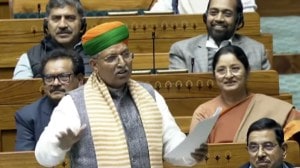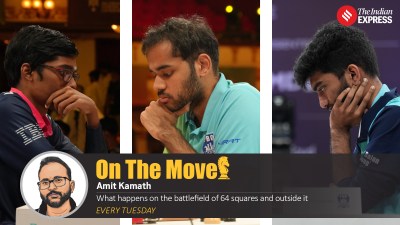THE focus of an impeachment bid in the Rajya Sabha where the Opposition has accused him of “hate speech” and “incitement to communal disharmony,” Allahabad High Court judge Justice Shekhar Kumar Yadav has been called by the Supreme Court Collegium for a meeting next week, The Indian Express has learnt. The meeting may be held as early as December 17.
The Collegium is headed by Chief Justice of India Sanjiv Khanna.

On December 10, the apex court had reportedly taken note of Justice Yadav’s controversial speech at an event organised by the legal cell of the Vishwa Hindu Parishad and sought “details” from the High Court.
On December 13, 55 Opposition MPs in the Rajya Sabha gave a notice for moving a motion to impeach him.
“The Collegium’s call for a meeting with Justice Yadav is being seen as part of the court’s internal processes…What action, if any, may follow depends on the meeting,” said an official here.
As a High Court judge, Justice Yadav is set to retire in April 2026.
Addressing the event organised by the VHP’s legal cell on the Allahabad High Court premises in the library of Allahabad High Court Bar Association last Sunday, Justice Yadav framed the Uniform Civil Code as a Hindu versus Muslim debate where the former had brought in reforms while the latter had not.
Story continues below this ad
“You have a misconception that if a law (UCC) is brought in, it will be against your Shariyat, your Islam and your Quran,” Justice Yadav said. “But I want to say one more thing… whether it is your personal law, our Hindu law, your Quran or whether it is our Gita, as I said we have addressed the ills (buraaiyan) in our practices… kamiyan thi, durust kar liye hain (the shortcomings have been addressed) …untouchability… sati, jauhar… female foeticide…we have addressed all those issues… Then why are you not doing away with his law… that while your first wife is there…you can have three wives… without her consent… that is not acceptable.”
Justice Yadav went on to say that Hinduism had the seeds of tolerance which Islam didn’t. “It is taught to us that…even an ant should not be killed. That is perhaps why we are tolerant and generous. Hame kisi ka kasht dekh karke kasht hota hai… kisike peeda ko dekhke peeda hota hai… par aapke andar nahin hoti hai… Why? Because when a child is born in our community, they are taught about God, the Vedas and Mantras right from the childhood… they are told about non-violence… lekin aap ke yahan to bachhpan se bachhe saamne rakh kar ke vadh kiya jaat hai pashuon ka (in your community, animals are slaughtered in the presence of children)… toh aap kaise apeksha karte hain ki sahishnu hoga woh… udaar hoga woh (how do you expect the person to become tolerant, kind?).”
ExplainedHouse versus in-house
The SC step comes even as 55 Rajya Sabha MPs moved a notice on December 13 for a motion to impeach Justice Yadav. Given the NDA numbers in both the Houses, that looks like a non-starter. So how SC deals with this is significant.
Justice Yadav said, “I have no hesitation in saying that this is Hindustan… and the country will run according to the majority who live in Hindustan.” He said the “law will operate on the will of the majority… if you look at families or the society… the will of the majority prevails”.
These remarks were strongly criticised by Opposition parties. In a letter to CJI Khanna, CPM leader and former MP Brinda Karat wrote: “No litigant can hope for justice in a court in which a member holds such a biased, prejudiced, publicly expressed opinion against the minority community and in favour of a majoritarian approach.”
Story continues below this ad
The Vice President of India (Chairman of Rajya Sabha) can accept or reject the Opposition’s impeachment notice.
If accepted, a three-member committee — two judges and a jurist — will be constituted to probe the complaint and determine if it is a case fit for initiating impeachment. This committee will include one judge from the Supreme Court and the Chief Justice of a High Court since the complaint is against a High Court judge.
According to Article 124 (4), the motion for impeachment “has to be supported by a majority of the total membership of that House and by a majority of not less than two-third of the members of the House present and voting” — in both the Lok Sabha and the Rajya Sabha. Given the NDA’s numbers in both Houses, the motion of impeachment is unlikely to clear either Lok Sabha or Rajya Sabha.









